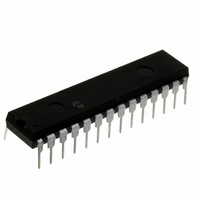PIC18F26J50-I/SP Microchip Technology, PIC18F26J50-I/SP Datasheet - Page 352

PIC18F26J50-I/SP
Manufacturer Part Number
PIC18F26J50-I/SP
Description
IC PIC MCU FLASH 64K 2V 28-DIP
Manufacturer
Microchip Technology
Series
PIC® XLP™ 18Fr
Datasheets
1.PIC18LF24J10-ISS.pdf
(32 pages)
2.PIC18LF24J50-ISS.pdf
(554 pages)
3.PIC18LF24J50-ISS.pdf
(12 pages)
4.PIC18F26K20-ISO.pdf
(430 pages)
Specifications of PIC18F26J50-I/SP
Program Memory Type
FLASH
Program Memory Size
64KB (32K x 16)
Package / Case
28-DIP (0.300", 7.62mm)
Core Processor
PIC
Core Size
8-Bit
Speed
48MHz
Connectivity
I²C, SPI, UART/USART, USB
Peripherals
Brown-out Detect/Reset, DMA, POR, PWM, WDT
Number Of I /o
16
Ram Size
3.8K x 8
Voltage - Supply (vcc/vdd)
2.15 V ~ 3.6 V
Data Converters
A/D 10x10b
Oscillator Type
Internal
Operating Temperature
-40°C ~ 85°C
Processor Series
PIC18F
Core
PIC
Data Bus Width
8 bit
Data Ram Size
3776 B
Interface Type
EUSART/I2C/SPI
Maximum Clock Frequency
48 MHz
Number Of Timers
5
Maximum Operating Temperature
+ 85 C
Mounting Style
Through Hole
3rd Party Development Tools
52715-96, 52716-328, 52717-734, 52712-325, EWPIC18
Development Tools By Supplier
PG164130, DV164035, DV244005, DV164005, PG164120, DM183032, DV164136, MA180024, DM183022
Minimum Operating Temperature
- 40 C
On-chip Adc
10-ch x 10-bit
Package
28SPDIP
Device Core
PIC
Family Name
PIC18
Maximum Speed
48 MHz
Operating Supply Voltage
2.5|3.3 V
Lead Free Status / RoHS Status
Lead free / RoHS Compliant
For Use With
AC164322 - MODULE SOCKET MPLAB PM3 28/44QFN
Eeprom Size
-
Lead Free Status / Rohs Status
Lead free / RoHS Compliant
- PIC18LF24J10-ISS PDF datasheet
- PIC18LF24J50-ISS PDF datasheet #2
- PIC18LF24J50-ISS PDF datasheet #3
- PIC18F26K20-ISO PDF datasheet #4
- Current page: 352 of 554
- Download datasheet (9Mb)
PIC18F46J50 FAMILY
21.2
The operation of the USB module is configured and
managed through three control registers. In addition, a
total of 22 registers are used to manage the actual USB
transactions. The registers are:
• USB Control register (UCON)
• USB Configuration register (UCFG)
• USB Transfer Status register (USTAT)
• USB Device Address register (UADDR)
• Frame Number registers (UFRMH:UFRML)
• Endpoint Enable registers 0 through 15 (UEPn)
21.2.1
The USB Control register (Register 21-1) contains bits
needed to control the module behavior during transfers.
The register contains bits that control the following:
• Main USB Peripheral Enable
• Ping-Pong Buffer Pointer Reset
• Control of the Suspend mode
• Packet Transfer Disable
In addition, the USB Control register contains a status
bit, SE0 (UCON<5>), which is used to indicate the
occurrence of a single-ended zero on the bus. When
the USB module is enabled, this bit should be
DS39931C-page 352
USB Status and Control
USB CONTROL REGISTER (UCON)
monitored to determine whether the differential data
lines have come out of a single-ended zero condition.
This helps to differentiate the initial power-up state from
the USB Reset signal.
The overall operation of the USB module is controlled
by the USBEN bit (UCON<3>). Setting this bit activates
the module and resets all of the PPBI bits in the Buffer
Descriptor Table (BDT) to ‘0’. This bit also activates the
internal pull-up resistors, if they are enabled. Thus, this
bit can be used as a soft attach/detach to the USB.
Although all status and control bits are ignored when
this bit is clear, the module needs to be fully preconfig-
ured prior to setting this bit. The USB clock source
should have been already configured for the correct
frequency and running. If the PLL is being used, it
should be enabled at least 2 ms (enough time for the
PLL to lock) before attempting to set the USBEN bit.
Note:
When disabling the USB module, make
sure the SUSPND bit (UCON<1>) is clear
prior to clearing the USBEN bit. Clearing
the USBEN bit when the module is in the
suspended state may prevent the module
from fully powering down
© 2009 Microchip Technology Inc.
Related parts for PIC18F26J50-I/SP
Image
Part Number
Description
Manufacturer
Datasheet
Request
R

Part Number:
Description:
Manufacturer:
Microchip Technology Inc.
Datasheet:

Part Number:
Description:
Manufacturer:
Microchip Technology Inc.
Datasheet:

Part Number:
Description:
Manufacturer:
Microchip Technology Inc.
Datasheet:

Part Number:
Description:
Manufacturer:
Microchip Technology Inc.
Datasheet:

Part Number:
Description:
Manufacturer:
Microchip Technology Inc.
Datasheet:

Part Number:
Description:
Manufacturer:
Microchip Technology Inc.
Datasheet:

Part Number:
Description:
Manufacturer:
Microchip Technology Inc.
Datasheet:

Part Number:
Description:
Manufacturer:
Microchip Technology Inc.
Datasheet:










